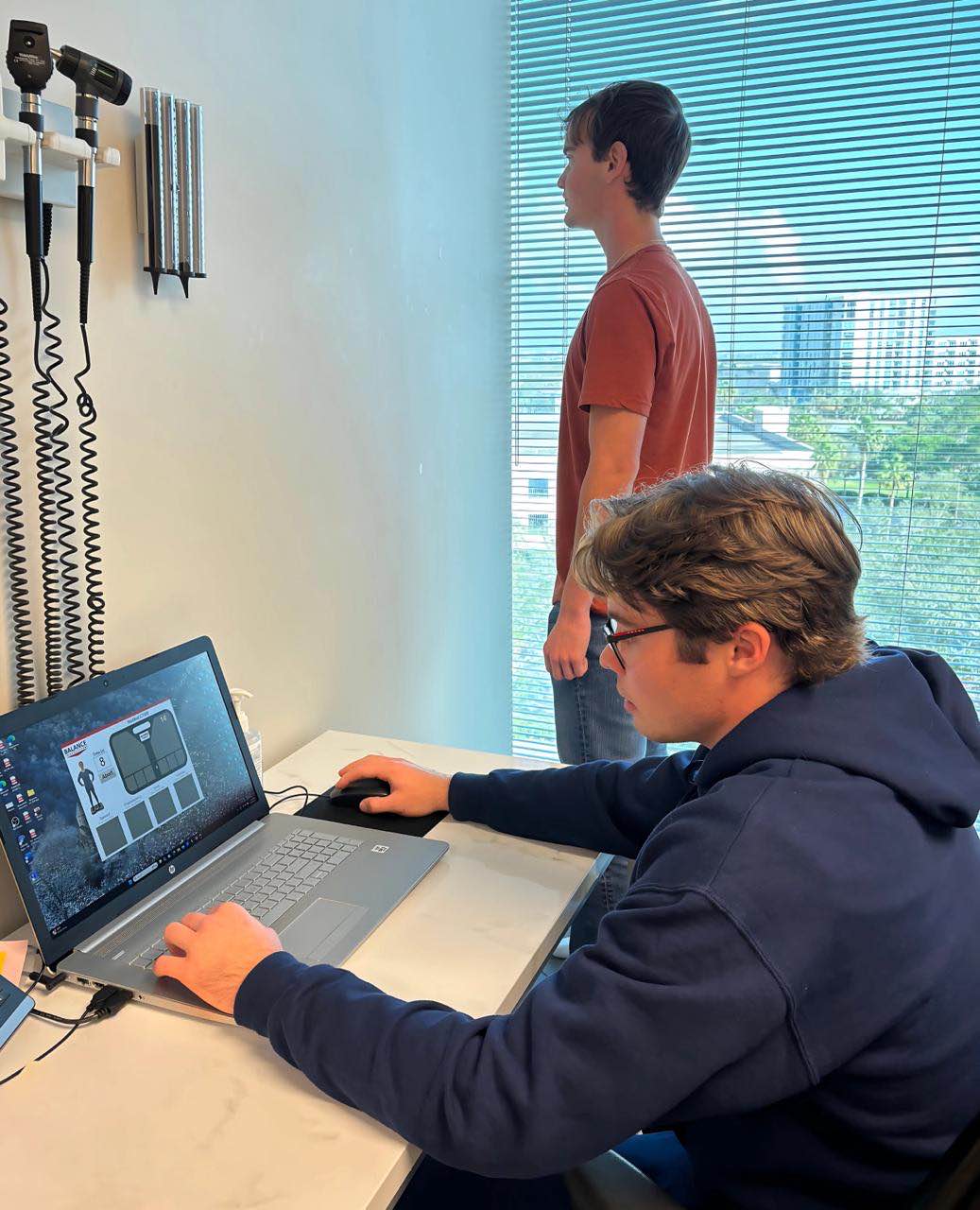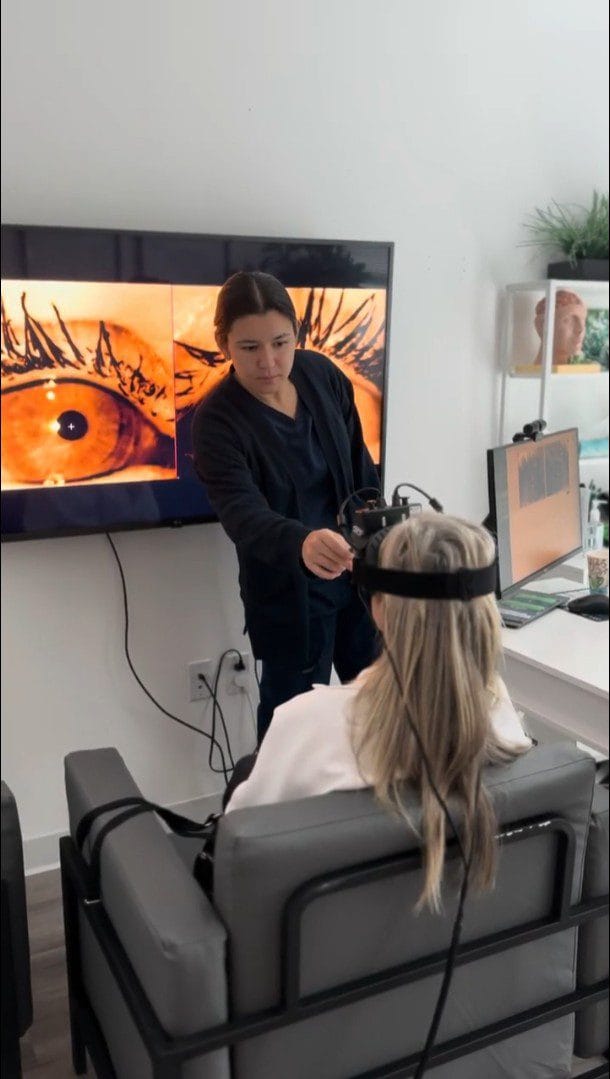Balance Testing in Tampa – Advanced Brain & Body Coordination Assessment for Brain Health
You Might Feel Fine — But Is Your Balance Telling a Different Story?
You don’t have to feel wobbly to have a balance problem.
Some people know they’re unsteady — they avoid stairs, crowds, or quick head turns because they feel dizzy or off-balance. But others feel “fine” standing still, yet struggle with things they never realized were connected to balance:
- Feeling dizzy or anxious in busy environments
- Trouble focusing after a concussion or head injury
- Slower reaction times in sports or daily life
- Motion sensitivity in cars, planes, or boats
- Fatigue or brain fog that hits when standing for long periods
Balance is more than just staying upright. It’s one of the most complex brain–body functions you have — and it affects everything from your confidence when walking to your ability to think clearly under pressure.

Balance Testing in Tampa – Advanced Brain & Body Coordination Assessment for Brain Health
Every step you take, every turn of your head, every movement you make — your brain is quietly running one of the most complex coordination systems in the human body: your balance system.
It’s powered by three core components that work together in milliseconds:
Vestibular system
Inner ear sensors that detect head position, movement, and acceleration
Vision
providing orientation, spatial awareness, and depth perception
Proprioception
Nerve signals from your muscles and joints telling your brain exactly where your body is in space
Every step you take, every turn of your head, every movement you make — your brain is quietly running one of the most complex coordination systems in the human body: your balance system.
It’s powered by three core components that work together in milliseconds:

When the System Breaks Down
Research shows that up to 50% of concussion patients have undiagnosed vestibular or balance dysfunction that persists long after their injury.
In older adults, even mild balance impairment doubles the risk of falling — and falls are the leading cause of injury-related ER visits in those over 65.
You don’t have to feel “wobbly” to have a balance problem. Disruption in even one part of this system — from a concussion, traumatic brain injury (TBI), stroke, inner ear disorder, or neurological condition — can cause:
- Subtle changes in how your eyes, ears, and muscles coordinate
- Fatigue or brain fog after standing or walking
- Slower reaction times in sports or daily life
- Anxiety or loss of confidence in movement
- Dizziness, disorientation, or motion sensitivity
These issues can chip away at your independence, your performance, and your peace of mind — but they often go undetected in routine exams.
When the System Breaks Down
The good news is, balance dysfunction isn’t a mystery. Using Balance Tracking Systems® technology as part of our GBI Quant360 Functional Analysis, we can measure your postural stability and sensory integration with scientific precision — down to fractions of a degree in movement.
By capturing this data, we can:
- Identify hidden balance deficits before they become bigger problems
- Pinpoint whether the issue is in your vestibular system, vision integration, or proprioception
- Create a targeted brain and body retraining plan to restore stability and confidence
For many of our patients, this is the moment they realize it’s not “just aging” or “just in their head” — it’s a fixable breakdown in their brain–body communication. And once we know where the problem is, we can help them reclaim the stability, speed, and confidence they thought they’d lost for good.
Why We Use Advanced Balance Tracking Technology
At Genesis Brain Institute, we believe balance is too important to leave to guesswork.
A quick “stand still with your eyes closed” test can miss the earliest — and most important — warning signs that your brain and body aren’t working together as they should.
That’s why, as part of our GBI Quant360 Functional Analysis, we use advanced computerized balance tracking technology to measure your stability with scientific precision. This isn’t about watching you wobble — it’s about capturing real data that reveals how your brain, vestibular system, vision, and body are communicating in every moment.

What This Technology Measures
- Postural sway – The tiny, often invisible shifts your body makes while standing still. Even slight increases can be an early indicator of concussion after-effects, neurological changes, or vestibular dysfunction.
- Sensory integration – How well your brain blends signals from your eyes, inner ear, and body to keep you steady. Poor integration can lead to dizziness, motion sensitivity, and slower reaction times.
- Reaction strategies – How quickly your brain and muscles respond when your balance is challenged — critical for preventing falls and optimizing athletic performance.
- Asymmetries – Differences between left and right that can point to neurological weakness, old injuries, or the early stages of degenerative conditions.
Why It Matters
By detecting subtle changes in your balance long before you feel them, we can:
- Pinpoint hidden issues that standard exams miss
- Identify the exact system — or systems — causing the problem
- Create a targeted plan to restore stability, confidence, and peak performance
This technology doesn’t just tell us if your balance is off — it tells us why.
And when combined with qEEG Brain Mapping, VNG Testing, and Pupillometry inside the GBI Quant360 Functional Analysis, it gives us a complete neurological blueprint — and the exact roadmap to help you recover, improve, and thrive.


What Balance Testing Reveals About Your Brain and Nervous System
Your balance isn’t just about your legs keeping you upright — it’s a full-brain performance test happening every second of your life.
When your balance is off, it’s your brain’s way of saying, “Something isn’t connecting the way it should.”
Our advanced balance testing goes far deeper than “pass/fail.” It gives us a detailed, data-driven map of how your brain and body work together — and exactly where that system is breaking down.
The Systems We Measure — And What They Tell Us About You
- Vestibular Health – Your inner ear is your body’s motion sensor. Even tiny deficits here can cause dizziness, vertigo, motion sensitivity, or that “off” feeling when you move your head quickly. We can spot these changes long before they’re obvious.
- Neurological Control – Your brain’s command center sends constant instructions to your body to keep you steady. Delays or misfires in this communication can slow your reactions, weaken your coordination, and increase fall risk — even if you feel “fine” most of the time.
- Visual Integration – Your brain relies on your eyes for orientation and depth perception. If your visual system isn’t fully syncing with your balance system, you may feel disoriented in crowds, have trouble walking in the dark, or lose focus in busy environments.
- Proprioceptive Function – This is your body’s internal GPS — nerve feedback from your muscles and joints telling your brain exactly where you are in space. Weak or inaccurate signals can make you clumsy, unstable on uneven ground, or hesitant when moving quickly.
Why This Matters
Small breakdowns in these systems can ripple into your daily life:
- Slower athletic performance
- Lingering concussion symptoms
- Anxiety about movement or leaving home
- More energy spent just trying to “stay steady” — leaving you drained for everything else
The good news? Every one of these systems can be trained, strengthened, and restored — once we know exactly where the problem is.
Inside the GBI Quant360 Functional Analysis, your balance testing results are combined with qEEG Brain Mapping, VNG Testing, and Pupillometry to create a complete neurological blueprint — and a plan to help you move with confidence again.
Why Balance Testing Matters for Your Brain and Your Future Health
Balance problems are more than an inconvenience — they’re often one of the earliest warning signs of concussion after-effects, neurological decline, or vestibular injury. Even mild deficits can double your risk of falling, and falls are the leading cause of injury-related ER visits for older adults.
The challenge? These issues are easy to miss until they cause something life-changing — a fall, a loss of confidence, or a gradual decline in independence and mobility.
Left Unaddressed, Subtle Balance Issues Can Lead To:
- Higher fall risk and serious injury
- Reduced athletic performance and slower reaction times
- Chronic dizziness, headaches, or neck pain
- Anxiety about movement or leaving home
- Decline in mobility and independence
The good news: With advanced balance testing as part of the GBI Quant360 Functional Analysis, we can detect hidden deficits before they become a crisis, pinpoint the exact source of the problem, and create a personalized plan to restore stability, rebuild confidence, and protect your long-term brain health.
Early detection means earlier treatment — and better outcomes.


From Testing to Treatment — And a Life Transformed
At GBI, Balance Testing is never just a stand-alone screen. It’s a vital piece of the Quant360 Functional Analysis, a whole-brain and whole-body evaluation that shows exactly where communication has broken down — and how to fix it.
Patient Story — “I Stopped Living in Fear of Falling”
“After my concussion, I felt off-balance every time I turned my head quickly. I started avoiding certain activities and felt anxious in crowds. The balance testing at Genesis Brain Institute pinpointed exactly which systems weren’t working together. My treatment plan targeted those areas, and within weeks, I was moving confidently again. I’m no longer afraid of falling — I have my life back.”
A Different Kind of Diagnostic — The GBI Quant360 Advantage
If you’ve ever been told “your balance is fine” after a quick in-office test — but deep down you know something’s off — you’ve already seen the limits of traditional exams. They give you fragments of information, but not the full picture.
The GBI Quant360 Functional Analysis is different. It’s the most comprehensive brain and body diagnostic we’ve ever offered — designed to uncover what others miss and give you the answers you’ve been searching for.
We combine:
- qEEG Brain Mapping – measures brain activity patterns and identifies areas that are overactive, underactive, or out of sync
- VNG Testing – evaluates eye movement control and brainstem function
- Pupillometry – measures autonomic nervous system health with unmatched precision
- Balance & Proprioception Testing – detects subtle coordination and stability deficits that impact confidence and performance
- Other advanced neurological metrics – reveals hidden issues most providers never test for
The result? Not just a list of problems, but a complete neurological blueprint — and a clear, personalized plan to restore, retrain, and optimize your brain and body.
For many patients, the Quant360 is the moment they finally understand why they’ve been feeling off — and exactly how to fix it.

Who Should Consider Balance Testing?
You don’t have to be falling over to benefit from advanced balance testing. This assessment can reveal hidden issues that affect stability, performance, and confidence in ways you may not expect. It’s especially valuable for:
Athletes
wanting faster reaction times, sharper coordination, and an edge over the competition
Concussion or TBI patients
still dealing with dizziness, instability, or “something just feels off” long after the injury
Older adults
Ready to reduce fall risk and stay active, independent, and confident
Individuals with vestibular disorders or inner ear damage
who experience vertigo, motion sensitivity, or balance changes
Patients with neurological conditions
Such as Parkinson’s, multiple sclerosis, or post-stroke changes affecting mobility
If you’ve been told “everything looks fine” but you still feel unsteady — or you want to protect and optimize your balance before problems appear — Balance Testing as part of the GBI Quant360 Functional Analysis can uncover the answers other exams miss.

Your Next Step in Balance Testing
Don’t wait until a fall, injury, or worsening symptoms force you to take action.
Balance Testing, as part of our GBI Quant360 Functional Analysis, is trusted for detecting early signs of concussion after-effects, traumatic brain injury, vestibular disorders, and neurological decline — as well as optimizing performance for athletes.
Whether you’re recovering from a head injury, protecting your mobility as you age, or pushing for peak performance, the Quant360 delivers what other exams can’t — clear answers, precise data, and a personalized plan to take action now.
Your stability is telling a story about your brain’s health. Let’s find out what it’s saying.

Balance is more than just standing upright. At Genesis Brain Institute in Tampa, our advanced balance testing reveals what’s really going on inside your brain and body.
We use computerized posturography with a modified clinical test of sensory integration and balance to assess the key systems that keep you stable:
- Proprioception (body awareness)
- Vision
- Vestibular function (inner ear balance)
These are connected to different parts of your nervous system—including the cerebral cortex, cerebellum, brainstem, and spinal cord.
Whether you’re experiencing dizziness, feeling “off,” or looking to detect subtle neurological changes early, our balance testing in Tampa provides a clear, data-driven view of your brain’s performance.
Know what’s really going on—before symptoms escalate.
